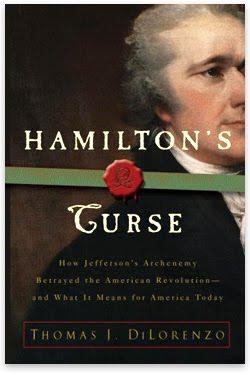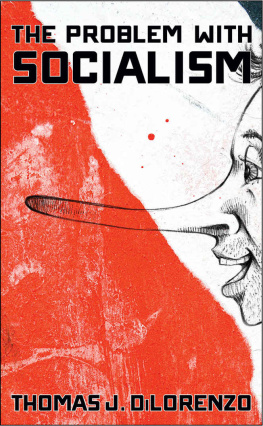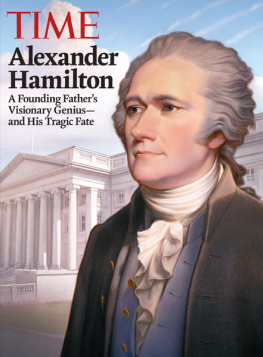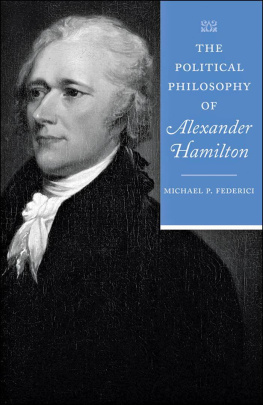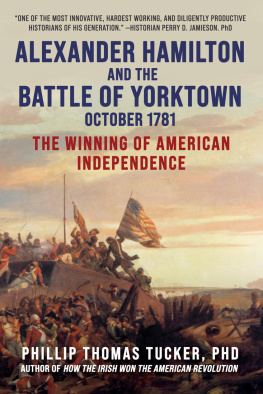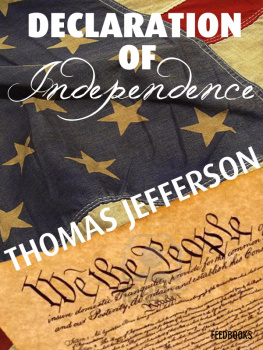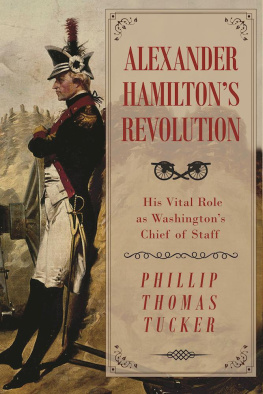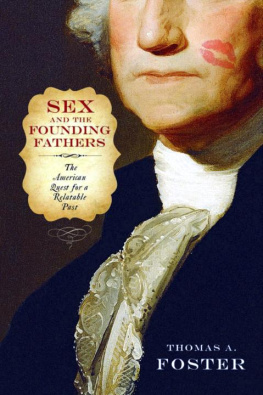
CONTENTS

INTRODUCTION
The Real Hamilton
CHAPTER 1
The Rousseau of the Right
CHAPTER 2
Public Blessing or National Curse?
CHAPTER 3
Hamiltons Bank Job
CHAPTER 4
Hamiltons Disciple: How John Marshall Subverted the Constitution
CHAPTER 5
The Founding Father of Crony Capitalism
CHAPTER 6
Hamiltonian Hegemony
CHAPTER 7
The Hamiltonian Revolution of 1913
CHAPTER 8
The Poisoned Fruits of Hamiltons Republic
CONCLUSION
Ending the Curse
Dedicated to the memory of
Professor Murray N. Rothbard,
a brilliant scholar and tireless defender of the free society.
INTRODUCTION

The Real Hamilton
[T]he power to raise money is plenary and indefinite [in the Constitution]. The terms general Welfare were doubtless intended to signify more than was expressed.
A LEXANDER H AMILTON , R EPORT ON M ANUFACTURES
Implied powers are to be considered as delegated equally [to the federal government] with express ones.
A LEXANDER H AMILTON , O PINION ON THE C ONSTITUTIONALITY OF THE B ANK OF THE U NITED S TATES
I deas have consequences, wrote the renowned conservative scholar Richard M. Weaver in a book by that title.1 Big ideas, moreover, can have big consequences, and there are probably no ideas in American political history bigger than the ones debated by Alexander Hamilton and Thomas Jefferson at the time of the founding. This battle of ideasand it was indeed a battleformed the template for the debate over the role of government in America that shapes our history to this day. The most important idea of all, in the minds of Hamilton and Jefferson, was what kind of government Americans would live under.
Hamilton was one of the most influential figures in American political history. He served as a delegate at the Constitutional Convention of 1787; was one of the authors of The Federalist Papers, which helped convince the states to ratify the Constitution; and was the nations first treasury secretary. Throughout these critical early years of the American republic, Hamilton made clear his political philosophy. To begin, he wanted a highly centralized government. He spoke out against the nations first constitution, the Articles of Confederation, precisely because he felt it did not give enough power to the national government, and at the Constitutional Convention he proposed a permanent chief executive who could veto all state legislationin other words, an American king. Hamilton wanted to use this centralized power to subsidize business in particular, and the more affluent in general, so as to make them supportive of an ever-growing state. As treasury secretary, he was a frenetic tax-increaser and advocated government planning of the economy. He championed the accumulation of public debt, protectionist tariffs, and politically controlled banks; belittled politicians like Jefferson who spoke too much of liberty; and believed that the new American government should pursue the course of national and imperial glory, just like the British, French, and Spanish empires.2
Thomas Jefferson held the exact opposite position on every one of these issues, and the two great menwho were also arch political rivalsclashed repeatedly. Jefferson championed limited, decentralized government, believing that history had shown that government had to be small and localized if individual liberty was to be protected. Thus he felt that most governmental functions should be the prerogative of the citizens of the sovereign states, not the central government. Unlike Hamilton, he was a strict constructionist with regard to the Constitution: he believed the national government had only those select powers (mostly for foreign affairs) that the sovereign states had expressly delegated to it in the Constitution; all others were reserved to the states respectively, or to the people, as enunciated in the Tenth Amendment.3 Economically, he believed that laissez-faire was the surest route to peace and prosperity. As president, his top priority was to eliminate all internal taxes, many of which Hamilton had supported as President George Washingtons treasury secretary. Jefferson was also a free trader and strongly opposed public debt and national banking as dire threats to natural rights. Finally, he believed that interfering in the affairs of other nations for the sake of imperial glory was a disastrous mistake.
Jefferson articulated his political philosophy in his first inaugural address, when he declared: [A] wise and frugal Government, which shall restrain men from injuring one another, shall leave them otherwise free to regulate their own pursuits of industry and improvement, and shall not take from the mouth of labor the bread it has earned. This is the sum of good government. On another occasion he summed up his view even more succinctly: That government is best which governs least. The motto of Hamilton, the consummate statist, might well have been That government is best which governs most.
Of the two political rivals, it is Jeffersonthe author of the Declaration of Independence and the third president of the United Stateswho is the better remembered today. But the reality is that Hamiltons vision, not Jeffersons, ultimately prevailed. As the conservative columnist George F. Will has written, today we honor Jefferson, but live in Hamiltons country.4
This is no cause for celebration. In fact, the triumph of Hamiltonianism has been mostly a curse on America.5 The political legacy of Alexander Hamilton reads like a catalog of the ills of modern government: an out-of-control, unaccountable, monopolistic bureaucracy in Washington, D.C.; the demise of the Constitution as a restraint on the federal governments powers; the end of the idea that the citizens of the states should be the masters, rather than the servants, of their government; generations of activist federal judges who have eviscerated the constitutional protections of individual liberty in America; national debt; harmful protectionist international trade policies; corporate welfare (that is, the use of tax dollars to subsidize various politically connected businesses); and central economic planning and political control of the money supply, which have instigated boom-and-bust cycles in the economy.
The American Revolution was fought against a highly centralized state that was headed by a despotic chief executive who pulled the strings of the British mercantilist economic system (that is, a system built on protectionism, government franchise monopolies, a state-run bank, and interventionism that benefited the state and its supporters at the expense of the general public) as an instrument of plunder at the expense of the colonists. But Hamilton devoted the last quarter-century of his life to enshrining this very system in America. Thus Hamiltonianismgovernmental consolidation, the elimination of true federalism, dominant executive power, and mercantilistic economic policiesamounted to nothing less than a betrayal of the principles for which Americans fought in the Revolution.
THE HAMILTON MYTHS
Alexander Hamiltons reputation has been propped up quite a bit in recent years, not least because he has been the subject of admiring biographies like Ron Chernows 2004 blockbuster. But in the rush to reclaim the reputation of the man whom the neoconservative commentator David Brooks called the most neglected of the Founding Fathers, writers have clouded Hamiltons record and perpetuated a number of dangerous myths.6
For example, Chernow mislabeled Hamilton as the prophet of the capitalist revolution in America, when in fact this founders hyperinterventionist approach to the economy was anything but capitalism.7 In reviewing Chernows book and in at least one other column, Brooks, who proudly calls himself a Hamiltonian, claimed that Hamilton somehow single-handedly created capitalism.8 The biographer Forrest McDonald made a similarly absurd assertion in giving Hamilton virtually all the credit for Americas becoming the richest, most powerful and freest nation in the history of the world.9
Next page
